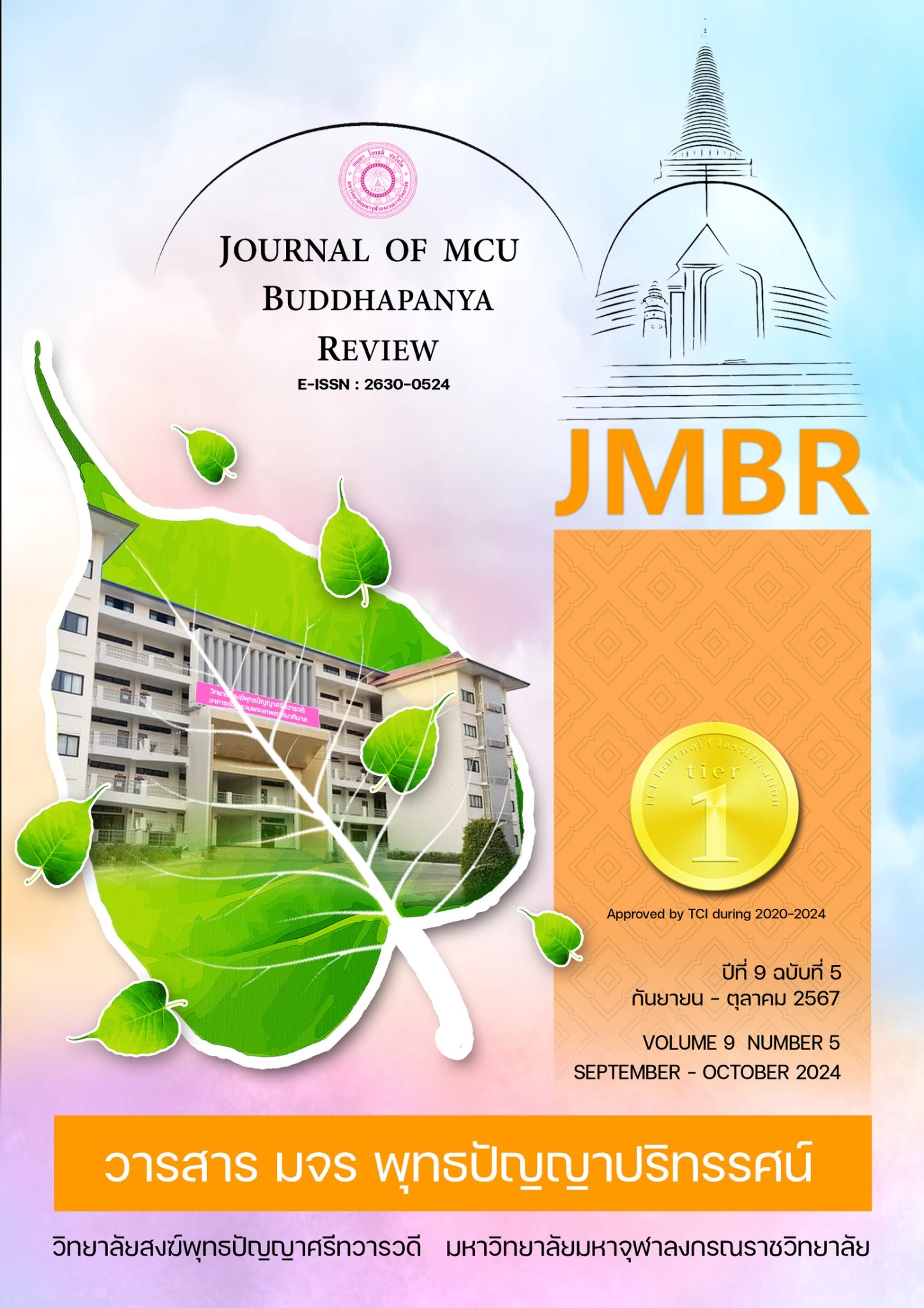การจัดการเรียนรู้โดยใช้ปัญหาเป็นฐาน เรื่อง ภัยธรรมชาติ เพื่อพัฒนาสมรรถนะการแก้ปัญหาแบบร่วมมือของนักเรียนชั้นประถมศึกษาปีที่ 6
คำสำคัญ:
การจัดการเรียนรู้โดยใช้ปัญหาเป็นฐาน, สมรรถนะการแก้ปัญหาแบบร่วมมือ, ภัยธรรมชาติบทคัดย่อ
สมรรถนะการแก้ปัญหาแบบร่วมมือเป็นสมรรถนะที่สำคัญในทักษะศตวรรษที่ 21 โดยการวิจัยครั้งนี้
มีวัตถุประสงค์เพื่อศึกษาแนวทางการจัดการเรียนรู้โดยใช้ปัญหาเป็นฐาน เรื่อง ภัยธรรมชาติและพัฒนาสมรรถนะการแก้ปัญหาแบบร่วมมือของนักเรียน ซึ่งผู้เข้าร่วมวิจัย คือ นักเรียนชั้นประถมศึกษาปีที่ 6 จำนวน 23 คน ใช้รูปแบบการวิจัยปฏิบัติการในชั้นเรียน เครื่องมือที่ใช้ในการวิจัย ได้แก่ แผนการจัดการเรียนรู้โดยใช้ปัญหาเป็นฐาน แบบสะท้อนการจัดการเรียนรู้ ใบกิจกรรม และแบบทดสอบสมรรถนะการแก้ปัญหาแบบร่วมมือ โดยวิเคราะห์ข้อมูลเชิงเนื้อหาและการตีความจากคำตอบของนักเรียน สถิติที่ใช้ คือ ค่าเฉลี่ย และร้อยละ
ผลการวิจัยพบว่าแนวทางการจัดการเรียนรู้ที่ส่งเสริมสมรรถนะการแก้ปัญหาแบบร่วมมือของนักเรียน คือ สถานการณ์ปัญหาที่ใช้ควรเป็นสถานการณ์ภัยธรรมชาติที่เกิดขึ้นจริงและใกล้ตัวนักเรียน ครูควรกระตุ้นให้นักเรียนมีการวางแผนการดำเนินงาน ลงมือปฏิบัติโดยการศึกษาเรียนรู้ด้วยตนเองและนำความรู้มาอภิปรายภายในกลุ่ม ร่วมกันประเมินบทบาทหน้าที่ของสมาชิกในกลุ่มเพื่อติดตามการทำงานร่วมกันอย่างต่อเนื่อง และนักเรียนส่วนใหญ่มีการพัฒนาสมรรถนะการแก้ปัญหาแบบร่วมมืออยู่ในระดับสูงขึ้นตามลำดับแผนการจัด
การเรียนรู้ โดยมีสมรรถนะการเลือกวิธีดำเนินการที่เหมาะสมในการแก้ปัญหาในระดับสูงมากที่สุด ร้อยละ 66.30 รองลงมาคือสมรรถนะการสร้างและเก็บรักษาความเข้าใจที่มีร่วมกัน ร้อยละ 63.59 และสมรรถนะ
การสร้างและรักษาระเบียบของกลุ่มร้อยละ 56.52 น้อยที่สุด
เอกสารอ้างอิง
Aroonsrimorakot, S. & Watcharadul, Y. (2016). UN Sustainable Development Goals: 17 aspects for future world. Journal of Thai Interdisciplinary Research. 16(4), 1-7.
Barrows, H.S. (1996). Problem-based learning in medicine and beyond: a brief overview. New Directions for Teaching and Learning, 1996(68), 3-12.
Charoensuk, S. & Chanunan, S. (2020). Development of Collaborative Problem Solving Competency of 11th Grade Students Using STEM Learning Through Engineering Design Process in Geological Phenomena. KKU Research Journal of Humanities and Social Sciences (Graduate Studies), 8(2), 22-34.
Claire S. & Esther C. (2017). Designs for Operationalizing Collaborative Problem Solving for Automated Assessment. Journal of Educational Measurement Spring 2017, 54(1), 12–35.
Graesser, A., Kuo, B. C., & Liao, C. H. (2017). Complex problem solving in assessments of collaborative problem solving. Journal of Intelligence, 5(2), 10.
Graesser, A. C., Fiore, S. M., Greiff, S., Andrews-Todd, J., Foltz, P. W., & Hesse, F. W. (2018). Advancing the science of collaborative problem solving. Psychological Science in the Public Interest, 19(2), 59–92
Hmelo-Silver, C. E. (2004). Problem-Based Learning: What and how do students learn?. Educational Psychology Review, 16(3), 235-266.
Institute for Research on Education System Foundation. (2017). Problem–based Learning : PBL. from http://www.ires.or.th/?p=801
Jantakoon, J. (2015). Diaster education: learning approach to disaster preparedness activities (Part 1). Journal of Education Naresuan University, 16(4), 188 –201.
Ketsing, J. (2019). Science Classroom Action Research: A Learning Pathway for Improving You. Bangkok: Charansanitwong Printing Co., Ltd.
Kozlowski, S. W, & Ilgen, D. R. (2006). Enhancing the Effectiveness of Work Groups and Teams. Psychological Science in the Public Interest, 7(3), 77–124.
Lertcharoenrit, T. (2020). Enhancing Collaborative Problem-Solving Competencies by Using STEM-Based Learning Through the Dietary Plan Lessons. Journal of Education and Learning, 9(4), 102-117.
Naboonmee, P. (2019). Problem-based learning for developing collaborative problem solving competency in rotational motion topic for grade 10th students. Journal of Education, Mahasarakham University, 13(2), 193-205.
OECD. (2013). PISA 2015 Draft Collaborative Problem Solving Framework. Paris: OECD. Retrieved from https://www.oecd.org/callsfortenders/Ann
Office of the Education Council. (2007). A student-centered learning management approach Problem-based learning management (1st edition). Bangkok: the Agricultural Co-operative Federation of Thailand, Ltd.
Partnership for 21st Century Skills. (2019). FRAMEWORK FOR 21st CENTURY LEARNING DEFINITIONS. Retrieved from https://static.battelleforkids.org/documents/p21/
Sitha, S. & Charoen-In, U. (2020). Developing collaborative problem solving in physics of Mathayomsuksa 5 students by using problem-based learning. Journal of MCU Nakhondhat, 7(5), 279-292.
Wood, D. (2003). "ABC of learning and teaching in medicine: Problem based learning". BMJ.
(7384): 328–330.
ดาวน์โหลด
เผยแพร่แล้ว
รูปแบบการอ้างอิง
ฉบับ
ประเภทบทความ
สัญญาอนุญาต
ลิขสิทธิ์ (c) 2025 วารสาร มจร พุทธปัญญาปริทรรศน์

อนุญาตภายใต้เงื่อนไข Creative Commons Attribution-NonCommercial-NoDerivatives 4.0 International License.



